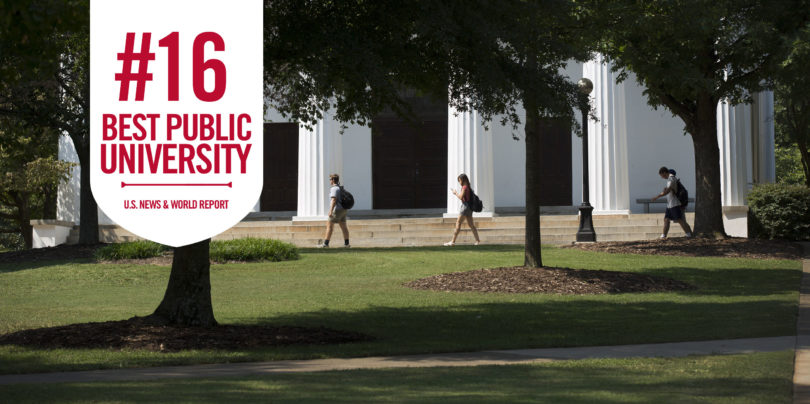The University of Georgia has climbed two spots to No. 16 in the U.S. News & World Report 2018 ranking of best public national universities, the highest ranking in UGA’s history.
“This recognition serves as yet another signal of the rise in stature of the birthplace of public higher education in America,” said President Jere W. Morehead. “I want to thank our faculty, staff, students, alumni and friends for their unyielding commitment to academic excellence. They are elevating UGA to heights never before imagined.”
This is the second consecutive year the university has risen in this ranking, and UGA is one of two institutions — along with the Georgia Institute of Technology — to make the top 20 from the state of Georgia. Georgia is one of only three states (including California and Virginia) to have more than one institution in the top 20. In addition, UGA and the University of Florida are the only two institutions from the Southeastern Conference to make the top 20.
Student selectivity was one factor that contributed to the higher ranking. The percentage of incoming freshmen in the top 10 percent of their high school class increased from 53 percent to 55 percent. In addition, the average standardized test scores of incoming freshmen increased.
“One of the university’s top strategic priorities is to continue to enhance the learning environment for students and to ensure their long-term success.” — Vice President for Instruction Rahul Shrivastav
These metrics reflect the steady rise in the quality of the UGA student body. This fall marked the fifth consecutive year that the freshman class set a record for academic qualification, as the Class of 2021 enrolled with an average high school GPA of 4.0 and a record average ACT score of 30. Applications for admission also have reached an all-time high.
“With bold new academic initiatives, the University of Georgia is pushing the boundaries of teaching and learning,” said Pamela Whitten, senior vice president for academic affairs and provost. “The higher education community is recognizing our efforts, and the brightest and most promising students from this state and across the nation are seeking a UGA education at unprecedented levels.”
UGA has launched a number of initiatives in recent years to promote student learning and success. The university has implemented an experiential learning initiative, for example, becoming the largest institution in the nation to provide hands-on learning to all undergraduate students.
The institution also has launched a campus-wide entrepreneurship certificate designed to prepare students to start their own businesses. As another example, UGA recently unveiled the Double Dawgs program to give students the opportunity to earn bachelor’s and master’s degrees in five years or less, saving time and money.
Vice President for Instruction Rahul Shrivastav has played an important role in designing and implementing these and other academic initiatives.
“One of the university’s top strategic priorities is to continue to enhance the learning environment for students and to ensure their long-term success. We are intensely focused on that priority every day,” said Shrivastav. “It’s no surprise that UGA is consistently ranked among the very best public research universities in the nation for the quality of its undergraduate education.”
Forbes recently ranked UGA at No. 17 in its 2017 list of top colleges that dominate academically and athletically. Kiplinger ranked UGA No. 10 on its most recent list of 100 best values among public colleges and universities, and The New York Times ranked UGA at No. 10 among public universities doing the most for low-income students in its 2017 College Access Index.
UGA’s upward momentum in the U.S News ranking also can be attributed to an increase in its alumni giving rate. Alumni support continues to grow as the Commit to Georgia Campaign advances toward the goal of raising $1.2 billion to expand the positive impact of the university on the state, nation and world.
National rankings are only one of many measures of academic quality in higher education. While rankings tend to fluctuate up and down from year to year, a more precise measure of performance can be found in academic outcomes such as retention, graduation and career placement rates. UGA continues to excel in these areas with 95 percent of first-year students returning for their sophomore year and 85 percent of students graduating within six years. In addition, 95 percent of UGA students are employed or enrolled in graduate school within six months of graduation.








